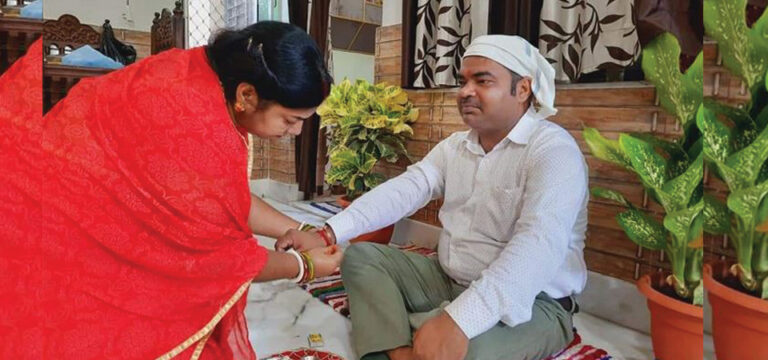
Rekha Yadav of Janakpurdham-25 is sad on the day of Rakshyabandhan. Her face is darkened by sorrow and pain as the memory of brother Ramesh, who has been in Qatar for four years, haunts her mind.
She said, “The day before Rakhi, I used to go to the market to buy a new and attractive Rakshyasutra. The next morning, when I reached the maternal home, I tied it around my brother’s hand. For years, I have not been able to feel the love and joy.”
Yadav’s brother had gone to Qatar four years ago for foreign employment. Her another brother, Manoj, studies Chartered Accountancy in Delhi, India. Coincidentally, her husband Binod Yadav is also in Saudi Arabia for work.
“Other times I miss my husband, I worry about him. But, during Rakshyabandhan, I remember my brothers a lot. I spend days waiting for them, even though they can’t come to tie the Rakhi,” she said.
Rekha is not alone, there are hundreds of sisters like her whose brothers are in foreign employment. While the Gulf countries are becoming the main destination for work due to poverty, most of them experience the absence of siblings in Rakshyabandhan.
It has been five years since Geeta Chaudhary left the country to make money for her family. She works in a beauty parlour in Bahrain.
On the day of Rakshyabandhan, she called her brother, Joshan, in Nepal through WhatsApp and asked him to tie the Rakhi in her name.
Lately, there is a growing trend for sisters who do not meet physically on the day to ask for a Rakshyasutra in their name by phone.
Brothers who are in foreign employment as well as working and studying inside the country are often unable to return home due to job obligations.
There is a tradition of cross-country marriage in the southern region of the country. It is customary to marry daughters across the border. And this time, many sisters were not able to come to the maternal home in Nepal due to restrictions enforced by the government amid the fear of COVID-19.
Sarita Sah of Janakpurdham-7 got married in Kaluahi of Madhubani district across the border.
Kaluahi is not far from Janakpurdham. However, due to the restrictions imposed by the Indian government on cross-border movement, she could not come to Nepal during Rakshyabandhan.
“I have completed the task of tying Rakhi with my sister through a virtual process. On the one hand, my sister held it in her hand. Here I tied another Rakhi on my hand. She pretended feeding the laddu, so I ate the same. I celebrated Rakshyabandhan with a little sadness and a little joy,” said Sarita’s brother Shyam.
Social media, which is becoming a very powerful and reliable medium to express one’s thoughts through writing or speaking, is also becoming important in terms of culture and traditional stability in recent years.
After the family members started moving away for various reasons, the happy moments of festivals have started to be shared through video calls.
“Digital technology has helped a lot in celebrating the festival in the current digital age where problems like break up of joint family and escaping from the village have become all but common,” said Sunita Sah, a famous singer from Mithilanchal.
She said that the practice of exchanging good wishes by looking at each other by bridging the gap of non-communication at this time has significantly narrowed the widening gap in relationship.
Source : RSS,






